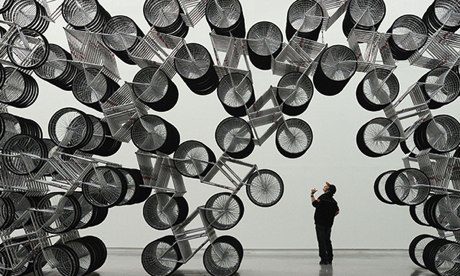Submitted by WA Contents
Why no Nobel prize for art? It’s as eloquent as literature
United Kingdom Architecture News - Oct 12, 2013 - 19:46 2998 views
Much has changed since Alfred Nobel decided to honour 'ideal' literature. So why hasn't the Nobel prize moved with the times?

Revolution of the times … Ai Weiwei's Forever Bicycles on display in Taipei. Are artists the modern-day custodians of the ideal? Photograph: Sam Yeh/AFP/Getty
Science, literature and peace are recognised – but why is there not a Nobel prize for art?
This may not be a totally daft question. It probably reveals something about cultural history. Since the Nobel prize was first awarded in 1901, it has always included literature in its mainly scientific and political mission.
This reflects the hierarchy of the arts at the beginning of the 20th century. Literature has been seen since ancient times as the most gentlemanly of cultural pursuits, and in the Romantic era it became the most moral. Poets are "the unacknowledged legislators of the world", claimed Shelley in 1821. By the end of the 19th century, that Romantic belief in literature's moral and political authority was a cliched idée reçueof middle-class culture.
It is also explicit in Alfred Nobel's will. Among the prizes to be funded by his fortune, he stipulates one for "the person who shall have produced in the field of literature the most outstanding work in an ideal direction".
"In an ideal direction": this Romantic, and Victorian, decree explains so much about the Nobel prize for literature. It's no use asking why a comic writer like Philip Roth never gets a Nobel prize. It's explicitly intended to award "ideal" writing or, to put it more bluntly, worthy writing.
This puts the Nobel prize at odds with a lot of the greatest writing of the past 112 years. Modern fiction was transformed after Nobel's death byJoyce and Borges and Nabokov – writers who were all in their different ways highly irresponsible.
They never got Nobel prizes.
Which brings us to art. The same transformations that have made literature fit very awkwardly into that notion of the ideal have also obliterated the distinction between word and image. Art is as eloquent as literature today. While the Nobel awards a myth of literary worthiness that has little to do with modern writing, it is, paradoxically, among artists that it might look for today's unacknowledged legislators.
From China, there's Ai Weiwei. From Nigeria, there's El Anatsui. From Britain, there are several artists who claim the kind of moral purpose the Nobel admires. What about a Nobel prize for Jeremy Deller?
So how about it, Nobel prize? Why not recognise visual art alongside literature? There are plenty of artists whose work tends "in an ideal direction".
by Jonathan Jones
> via Guardian
